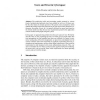Free Online Productivity Tools
i2Speak
i2Symbol
i2OCR
iTex2Img
iWeb2Print
iWeb2Shot
i2Type
iPdf2Split
iPdf2Merge
i2Bopomofo
i2Arabic
i2Style
i2Image
i2PDF
iLatex2Rtf
Sci2ools
116
click to vote
SPW
2000
Springer
2000
Springer
Users and Trust in Cyberspace
The underlying belief and knowledge models assumed by various kinds of authentication protocols have been studied for well over 10 years now. On the other hand, the related question of the generic trust assumptions, which underlie the settings where the protocols are run, has received less attention. Furthermore, the notion of trust, as it is typically defined, has more been based on the formal model used than the real user requirements posed by the application context and the actual people using the system. In this paper, we approach that problem from the users' point of view. We briefly describe what are the psychological bases on which typical people build their trust assumptions on, and consider how these are reflected in a typical e-commerce setting today. Given this background, we proceed to contemplate how the systems could be made more trustworthy by explicitly representing the trust assumptions and requirements, and how these digital expressions of trust could be instrume...
Authentication Protocols | Generic Trust Assumptions | Security Privacy | SPW 2000 | Trust Assumptions |
Related Content
| Added | 25 Aug 2010 |
| Updated | 25 Aug 2010 |
| Type | Conference |
| Year | 2000 |
| Where | SPW |
| Authors | Pekka Nikander, Kristiina Karvonen |
Comments (0)

